Gen Z Is Making Leaders Rethink Work Culture
Scan any recent headline about Gen Z at work, and you’ll find familiar themes: toxic cultures called out, quiet quitting, burnout, and the need to prioritize mental health.
News
- Adani Power Sets Up Nuclear Subsidiary
- Musk Unveils xAI Overhaul, Lunar AI Ambitions
- Former GitHub CEO Dohmke Raises $60 Million to Build AI Code Infrastructure
- Leadership Shakeup Deepens at xAI as Two Co Founders Exit
- India Slashes Social Media Takedown Window to Three Hours
- Cisco Moves to Relieve AI Data Center Gridlock With New Chip

In today’s workplace, Generation Z isn’t just making their presence felt; they’re making their work heard to their managers. From questioning outdated norms to prioritizing mental well-being, they’re challenging companies to rethink culture, communication, and leadership.
Scan any recent headline about Gen Z at work, and you’ll find familiar themes: toxic cultures called out, quiet quitting, burnout, and the need to prioritize mental health. But behind the buzzwords is a deeper, data-backed transformation.
Contrary to the stereotype that younger workers only chase bigger paychecks, Gen Z is showing signs of achieving success. According to a Deloitte report, while salary still matters, this generation values it less than any before. When asked to choose between a boring but well-paying job and a lower-paying but more interesting one, the generation is almost evenly split.
The message is clear: paychecks alone aren’t enough. Employers need to connect with Gen Z on a deeper level. “To win the hearts of Generation Z, companies and employers will need to highlight their efforts to be good global citizens,” the report said. Gen Z expects real commitment, not just talk, on issues like climate change, hunger, and inequality.
A Fragile Financial Reality
But let’s not romanticize the purpose-over-pay narrative too much. Gen Z also faces economic pressures earlier in their careers than previous generations.. A McKinsey & Company survey found that 45% of Gen Z worry about job stability, and many say their earnings don’t support a good quality of life. Nearly half say they couldn’t cover basic living expenses for more than two months if they lost their job.
These anxieties may partly explain why Gen Z is always looking for “what’s next.” According to the 2024 EY Work Reimagined Survey, 38% of employees said they’re likely to quit in the next year, a number driven largely by Gen Z professionals.
Rethinking Leadership
In an exclusive conversation with MIT SMR India, Rituparna Mandal, Vice President at Synopsys, offered a balanced perspective on intergenerational friction..
“Honestly, I’d give more advice to leaders than to Gen Z. Every generation brings new ideas and expectations, and that’s always been the case. We just label it more now,” she said.
She acknowledged the shift from hustle-heavy work cultures to a more holistic approach to life. “When I started my career, work was everything, weekends included. But today’s young professionals have fuller lives and different priorities. That’s not wrong. In fact, Gen Z brings speed, adaptability, and a fresh mindset.”
Still, she said a word of advice: “Experience has value, even if it’s not immediately visible. Mutual respect is key.”
At Happiest Minds Technologies, Gen Z makes up 26% of the workforce, and their digital fluency is fueling transformation. Speaking to MIT SMR India, Co-Chairman and CEO Joseph Anantharaju said he sees Gen Z not as a challenge to manage but as a powerhouse of potential.
“They bring a fresh, entrepreneurial mindset and are deeply driven by purpose. But their desire for rapid growth can sometimes raise concerns around long-term retention,” he said.
To bridge the gap between generations, Happiest Minds launched “MentorUp,” a reverse mentoring program where Gen Z professionals coach senior leaders on emerging tech, trends, and behaviors. “It strengthens intergenerational collaboration and fosters a more inclusive, future-ready workplace,” said Anantharaju.
For Ashish Tandon, CEO of cybersecurity firm Indusface, managing Gen Z has been a masterclass in balance. At 51, he’s the oldest employee at the company.
“That means two things. First, you work harder on your fitness just to keep up and not look out of place! But seriously, they’re incredibly smart, especially with their grasp of new technologies, he said.
At Indusface, performance is outcome-focused. Employees are free to choose how they work, nine hours at the office or four hours remotely, as long as deliverables are met.
“We’ve been certified as a Great Place to Work for five years in a row, and our attrition is among the lowest in the industry. That speaks volumes,” said Tandon.
Where Do We Go from Here?
Gen Z is not afraid to speak up, and that’s not a threat to organizational culture; it’s an opportunity. As companies face talent wars and tech disruption, understanding and adapting to the values of younger professionals may be the differentiator between legacy and relevance.
In the words of Mandal from Synopsys, “Once both sides stop judging and start learning from each other, things will fall into place.”
And that may just be the most Gen Z thing of all: choosing dialogue over hierarchy, collaboration over competition, and meaning over mindless grind.






